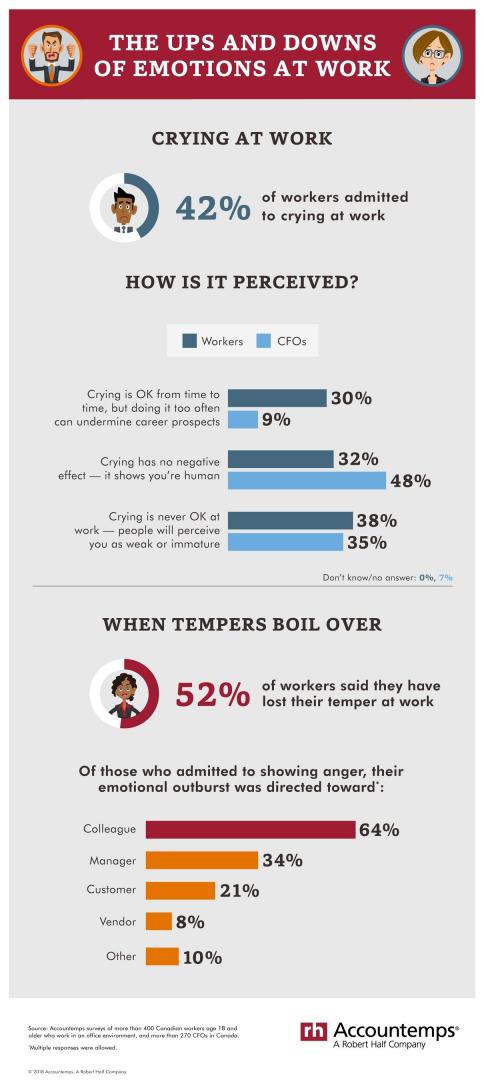Have You Ever Cried at Work?
Published April 5, 2018 at 4:30 pm

There’s no crying in baseball, as Tom Hanks famously said in A League of Their Own … but what about shedding tears at work?
More than four in 10 Canadian workers say they’ve cried on the job, a new Accountemps survey finds.
And nearly half of executives, or 48 per cent, say it’s OK and said shedding tears has no negative effect on how a worker is perceived.
But employees are harder on themselves than executives: 38 per cent of employees compared to 35 per cent of CFOs said crying is never acceptable at the office.
Workers who are 55 and older are more likely to think crying has a negative effect on your reputation (47 per cent) than those ages 35 to 54 (42 per cent) and 18 to 34 (31 per cent).
More than half of employees (52 per cent) polled have lost their temper on the job.
Of those who admitted showing anger, 64 per cent said their emotional outburst was directed toward a colleague while another 34 per cent said it was aimed at their manager.
“Occasionally getting emotional at work is understandable, but frequent upsets can damage your reputation, and negatively impact coworker relationships and productivity,” said Canadian president of Accountemps David King.
“In frustrating situations, it helps to take a step back before you react. Approaching challenges with patience and composure demonstrates your professionalism, and can set you apart for career advancement or growth opportunities.”
 Here are five scenarios, via Accountemps, that can test even the coolest head and advice for handling each with professionalism and emotional intelligence:
Here are five scenarios, via Accountemps, that can test even the coolest head and advice for handling each with professionalism and emotional intelligence:
The overbearing boss — Your manager keeps a close eye on you and gives you little control over projects. This can cause more stress and decreased morale and productivity. Instead of becoming frustrated, set up a private meeting with your boss to discuss ways you can build trust and gain more independence.
The combative coworker — You and your colleague keep butting heads on a business problem. Try to consider your coworker’s perspective. Hearing another point of view may help you both resolve the dispute more quickly.
The innocent error — As soon as you hit “send” on an email to your boss, you realize you’ve made a mistake. Instead of yelling out in frustration and distracting others, keep a level head as you address the situation. Send a follow-up note or speak with your manager to apologize and correct the issue.
The personal emergency — Private struggles, such as a family crisis or health concerns, are bound to affect your work life at some point in your career. Consider talking to your boss — without oversharing — and request scheduling flexibility or a personal leave. Being transparent can ultimately benefit you and your employer.
The unbearable workload — Juggling too many tasks can lead to burnout. Instead of lashing out when your manager assigns you more work, meet to prioritize and possibly delegate projects to your teammates or temporary hires.
Do you think crying is acceptable in the workplace?
insauga's Editorial Standards and Policies advertising





